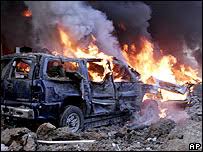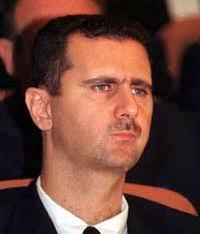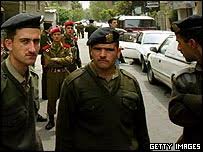Crushing a Flower of the Cedar Revolution
Advanced copy , various web sites, Front
Page Magazine, November 23, 2006
The
assassination of Lebanese Christian politician Pierre Gemayel this
Tuesday has revealed that the Tehran-Damascus axis remains busy with
terror activities across the Fertile Crescent.
When UN Security Council resolution 1559 passed in 2004, reaffirming
Lebanon's political independence and calling for the withdrawal of
the Syrian occupation army and the disarming of Hezbollah, Syria's
Ba'athist regime pledged heavy retribution against those Lebanese
who would dare join the international campaign for freedom triggered
by the U.S.-led War on Terror.
Damascus has kept its promise. In the fall of 2004, a former
minister from the Druze community, Marwan Hamade, was targeted with
a car bomb. While Hamade survived, Rafiq Hariri, the former Sunni
Prime Minister of Lebanon, was not so fortunate. On February 14,
2005, he was killed in an explosion orchestrated by highly trained
terrorists.


Hamade attempt
Hariri
assassination
Dozens of Lebanese civilians were also killed and maimed in the
blast. This prompted thousands, mostly students, to take to the
streets and demand the withdrawal of Syrian forces and the end of
the occupation of their country. In response, Syria ordered the
Lebanese Army, via the pro-Syrian government headed by Prime
Minister Omar Karami, to send in troops to shut down the "Lebanese
intifada."
The
Lebanese people refused to be intimidated. As the world watched on
television, the youth of Lebanon, soon joined by the masses of the
country, painted the colors of freedom on their faces and marched
through the lines of Lebanese soldiers. Women first, boys behind,
and the elderly following, they crossed into downtown Beirut in an
inspiring illustration of national defiance. One and a half million
people marched through the capital and the suburbs in what came to
be known as the "Cedar Revolution."
 The Cedars Revolution
The Cedars Revolution 
Instead
of authoritarianism and religious fundamentalism, the Lebanese
longed for freedom and peace. Given political freedom, the Lebanese
-- Sunnis, Druze and Christians, along with a growing number of
Shiite moderates -- emerged as majorities in the country's
government, including in municipalities, student unions, and
parliament.
It
was a powerful slap in the faces of Syria's Bashar Assad and Iran's
Mahmoud Ahmadinejad. Both disliked the emerging democratic forces.
Hence, cooperation solidified between Tehran and Damascus. In
partnership with their common client, Hezbollah, the two regimes
launched a campaign to kill the idea of Middle Eastern freedom in
its infancy.
Qassir assassination Hawi
assassination Chidiac attempt Tueni
assassination
In
the summer of 2005, progressive Lebanese leaders George Hawi and
Samir Qassir were assassinated. Journalist May Chidiac was maimed by
a bomb. In December the bright, young and promising Jubran Tueni, a
member of the Lebanese Parliament and publisher of the daily an
Nahar, was killed. Hezbollah lured others, such as General
Michel Aoun, into cooperation. During the winter and spring of 2005,
Nabih Berri, the pro-Syrian speaker of the Parliament, played the
role of Don Corleone , inviting the senior political leaders
of the country to what the mafia calls a "sit down." After weeks of
sterile talks, the "loaded dialogue" failed.




Ahmedinijad
Assad
Nasrallah Lahoud
But
the effects of the intimidation campaign were palpable. The
government of Fouad Siniora hesitated to call for U.N.
implementation of resolution 1559. Non-governmental organizations
who appealed for action on this front were informed that the fear
was too great. "Hezbollah is up to terrible things,"
Lebanese-Americans told the bipartisan committees in the U.S.
Congress and the Bush administration. Lebanese memos to the United
Nations stated: "The country has been taken hostage."
This prophecy was soon realized when Hezbollah chieftain Hassan
Nasrallah, with Machiavellian success, dragged Lebanon and Israel
into a surprise war this past July. For Nasrallah, the war was an
opportunity, a chance to reassert himself as a "legitimate" player
in Beirut and destroy the gains of the people's revolution. For Iran
and Syria, it was a chance to undermine the newly independent
Lebanese government. For the majority of Lebanese, it was a
nightmare. They did not want a war, let alone a regional one.
By
the end of October 2006, Hezbollah and its allies felt confident
enough to launch a new bid for power. Nasrallah rallied his troops
in the suburbs of Beirut, urging them to arm for the coming urban
jihad. Thousands of militiamen, as well as the Syrian Mukhabarat
intelligence service and possibly suicide bombers, were tasked to
invade the capital.



Hezbollah Syrian
National-Socialists Syrian security officers
Mukhabarat' operatives were readied to cut off water and electricity
and to surround Lebanese police stations. Hezbollah also demanded
that Prime Minister Siniora's government recant its decision to
accept the UN Tribunal investigation of Rafik Hariri's assassination.
It was expected that the ensuing indictment would touch high-ranking
officials in the Syrian regime, Hezbollah's patron. Also discernible
was the influence of Iran. If the Syrian regime were to be weakened,
so too would be the Iran-Syria axis, leaving the mullahs alone in
the Middle East. The Lebanese democrats had to go.
If
Iran and Syria had any doubts about their strategy of
destabilization, the midterm elections in the United States
dispelled them. On November 7, the opposition party in the United
States grabbed both houses of Congress. Although an unremarkable
feature of American and Western politics, this shift in power was
read by Iranian and Syrian elites as a collapse of American
determination to defend democracies in the region. Ayatollah
Khamenei declared: "The defeat of Bush in Congress is a victory for
us." He was echoed in Lebanon by Hassan Nasrallah: "America is being
defeated and is leaving the region. Those who worked with the US
will pay the price."
Further reinforcing suspicions in Tehran and Damascus, the Iraq
Study Group, headed by presidential advisor James Baker, is slated
to recommend next month that Washington backtrack from its policy of
promoting democracy in order to cut deals with…Iran and Syria.
On
the basis of these developments, Iran and Syria concluded that the
time was ripe to strike a punishing blow against democratic forces.
But Lebanese leaders moved first. They emphasized that they would go
to the UN and lead the masses into the streets against foreign
interference in Lebanese politics. Calculating the numbers of the
opposition, the "axis" commanders in Lebanon shifted tactics.
Instead of sending in troops, a decision was made to send in the
death squad to "mollify" the resistance.
 UN Security Council
UN Security Council
The
warning signs came last week. The ministers of Hezbollah and the
Shiite Amal Party resigned from the Lebanese council of ministers to
shake the "legitimacy" of the cabinet. They failed. The Lebanese
Constitution is clear: You need more than one third of the members
to collapse a cabinet. Therefore, the "axis" needed to eliminate
three members, one after the other. Thus the decision was made to
kill the youngest, brightest and most vocal Lebanese minister, a
true symbol of Lebanon's civic revolution: Pierre Gemayel.


Unlike the warlords and senior politicians, the 34-year-old MP acted
like a head of a happy family, with a wife and children. He drove
his own car in the middle of the most dangerous urban areas, and
socialized with neighbors, partisans and friends. He was living the
life he was struggling to defend: one of peace, freedom and
democracy. It was abruptly ended on Tuesday. Two vehicles blocked
Pierre Gemayel's car, while several assassins shot the young leader
"execution style."
Gemayel is dead, but, as his younger brother Sami told his friends,
"The march continues." On these shores, the question arises: What
should be done?
The
answer is clear. The United States and the new Congress must be
implacable in resisting the onslaught of terror and fascism in the
Middle East. When cynical politicians, interest groups and apologist
academics call for the appeasement of Iran and Syria, resist them.
When a population is endangered and its leadership is being
eliminated, assist them. Will the new Washington rise to the
occasion?
****
Dr Walid
Phares is the author of the newly released book
Future Jihad . He is also a
senior fellow with the Foundation for the Defense of Democracies in
Washington DC.
Phares@walidphares.com